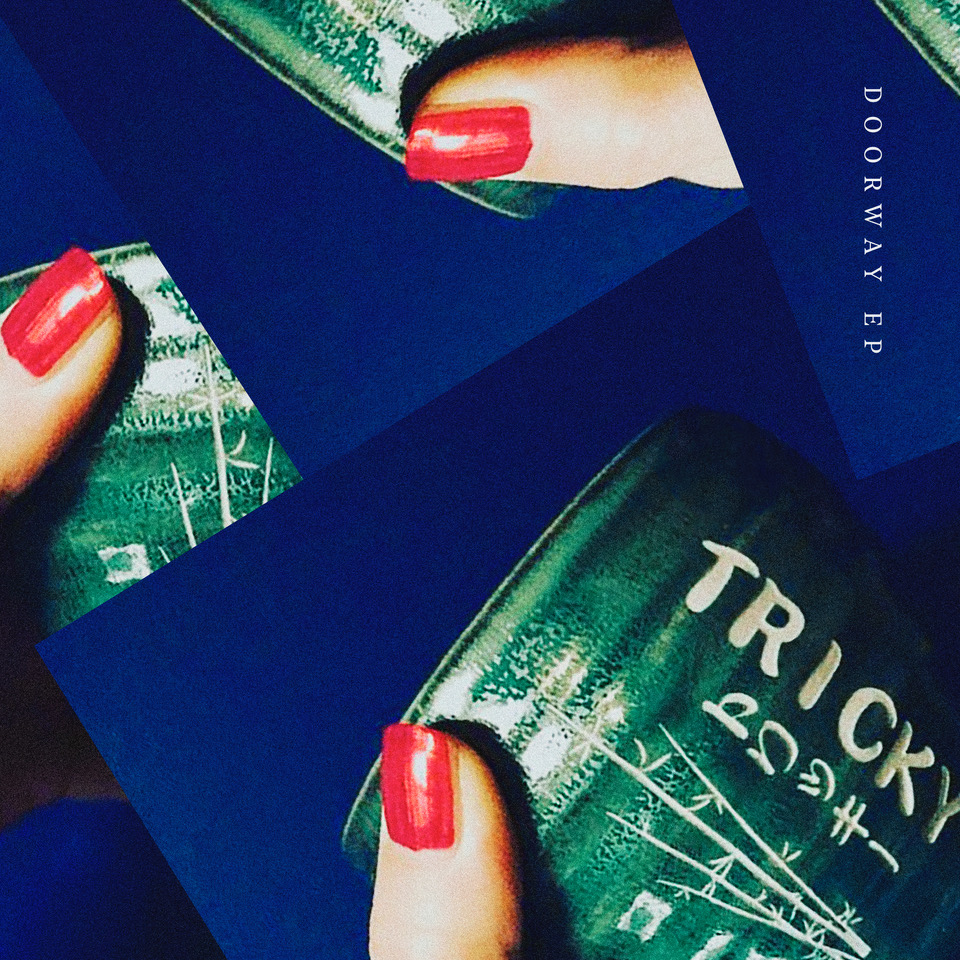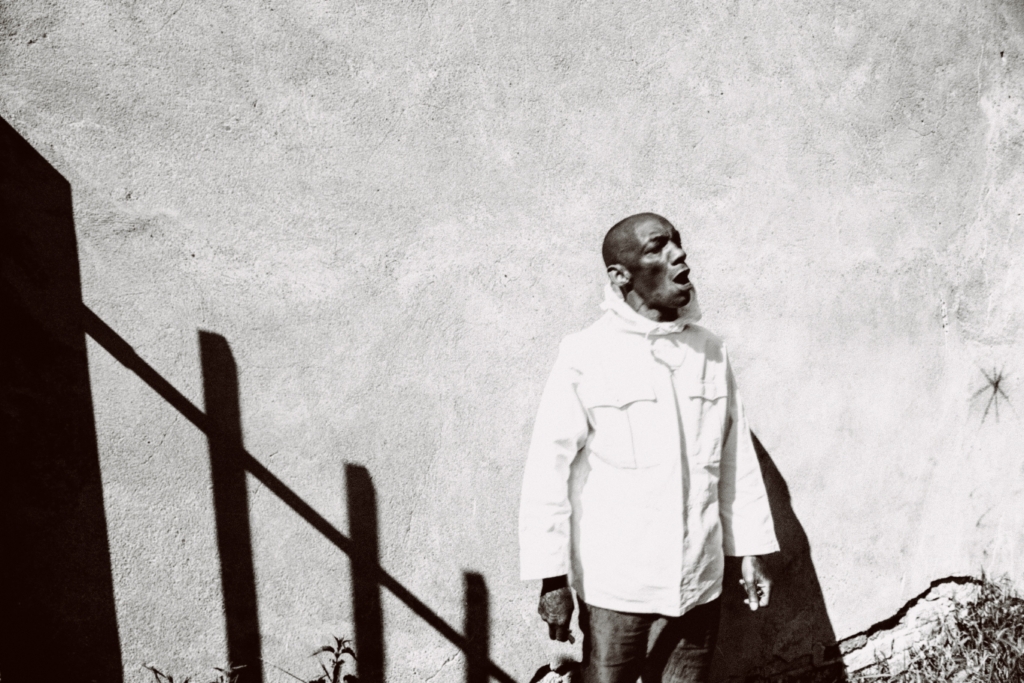Tricky
Fall To Pieces (False Idols)
Contact Sam McAllister about Tricky
Before we get on to Tricky’s astonishing new album Fall To Pieces – and before we talk about the creative highs and traumatic lows he’s been through during the making of it – there’s something he wants you to know.
“I feel like I’m back,” he says, voice full of swagger. “I feel like I’m one of the best musicians England’s ever had, and it’s time for me to focus on music again, 100%, like how I used to do at the beginning. That competitive thing I used to have when I was younger, like, my music is on a different level – that’s how I feel again now.”
Tricky might be over three decades deep into his music career but he’s currently on a creative roll. In the last year he’s put out an acclaimed autobiography, Hell Is Round The Corner, dropped the enchanting 20,20 EP and is on the verge of releasing Fall To Pieces, his 14th studio album.
And yet shortly before this flurry of activity, Tricky had been floored by tragic news: the passing of his daughter Mazy. “I’ve never loved like that before and I didn’t realise it until she was gone”, he says, “I was traumatised.”
One of the first tracks he worked on following Mazy’s death was ‘Hate This Pain’, a looped piano riff onto which Tricky could whisper darkly of his torment. If Tom Waits updated the blues as a bone-rattling new sound for the 80s, then this is Tricky’s stark new decade update: “What a fucking game/I hate this fucking pain/Was crying on the coast/Baby girl she knew me most.”
The recent writing of his autobiography – a compelling tale of Tricky’s chaotic childhood in Bristol’s Knowle West littered with tales of violence – proved to be a key inspiration for his new music. One of the stories he revisited in the book revolved around his uncle, who had just got out of prison: “He had no money, it was raining and he lit a cigarette and said ‘What a fucking game’. When he first told me that story I was young, I didn’t understand. But when you go through stuff yourself, you think fuck me, I know what he was talking about now.”
Like that book, Fall To Pieces is a work of intense emotions. But Tricky is keen to point out that the tracks can be deceptive. With its tense synths and distorted dial tones, ‘Chills Me To The Bone’ contains the line: “From the depths of my despair, I can’t wait to meet you there.” Yet its writer feels the song might actually be a hopeful one. “It’s more like … is that an old relationship? Maybe a family member or friend, and I’m saying, I will get myself back together again.”
Indeed, the album is stylistically diverse, with the strongest counterpoints to the likes of ‘Hate This Pain’ and the similarly stark ‘Close Now’ coming in the form of ‘Fall Please’ (which Tricky likens to Washington DC Go-go) and the featherlight ‘I’m In The Doorway’. The latter, as beautiful and beguiling as Dirty Projectors at their sweetest, has Danish singer Oh Land cooing: “I’ll bring you greetings/And hidden meanings/Can you hear me breathing?/Can you feel me ?”
These song’s accessibility – albeit a strange and twisted accessibility – surprised even the man who wrote them. “With most of my stuff, there’s nothing else like it around,” says Tricky. “But with ‘Fall Please’ and ‘I’m In The Doorway’ I’ve managed to do something I’ve never been able to do before, which is that everyone will feel it – even people who ain’t into my music. You could be in a club, or in a bar, and you’ll feel it. It’s my version of pop music, the closest I’ve got to making pop.” It even made Tricky reassess his approach to music. For the first time in a while – maybe ever – he felt the need for other people to hear his songs, for an extra layer of care and attention to go into them.
Fall To Pieces was recorded in Tricky’s Berlin apartment, over the course of two or three months in late 2019. The tracks are often short, ending abruptly and moving on to the next without warning. Tricky’s music has always enlisted female vocalists to carry his ideas – back in the day he believed they were vocalising his mum’s creative energy from beyond the grave. The majority of tracks on Fall To Pieces rely on Marta Złakowska, the singer he discovered during a Polish tour when he was left without a vocalist on the opening night: the local promoter suggested a girl who worked in a nearby bar, and when she arrived she had already learned the chorus to Tricky’s song ‘When We Die’. She saved the tour from disaster and afterwards Tricky said to her: “Look, if you give me 12 months of your time, so I don’t have to look for a singer on tour, I will help you with your music afterwards and you can be on my album.”
It sounds fortuitous – much like when Tricky encountered his original female vocalist Martina Topley-Bird by chance when she sang outside his front door. But of course he has an intuition too. “Yeah, I can tell when someone is humble and down to earth. Marta doesn’t care about being famous, she just wants to sing.”
Being based in Krakow – a couple of hours from Berlin – meant that they were able to work together relatively easily. “It was meant to be,” he says of their working relationship. “The shows were so good straight away. What I liked about her was that she would never hide her feelings from the crowd. She ended up touring with me for almost two years, gave up so much time travelling the world while her boyfriend was in Krakow. And then she ended up being an incredible singer in the studio too. I lucked out.”
Elsewhere, Tricky leaned on classically trained cellist Marie-Claire Schlameus who, he marvels, “can play to anything, and will try anything”. Not that she, or any of the players on the record, is guaranteed to recognise all of her contributions, such is Tricky’s singular vision: “What a musician plays in the studio isn’t always going to be the same on my album – it don’t work like that!” he says, through a cheeky grin. “So I would get her to play and then sample things, or replay them on the keyboard or move things around. It’s the same with electric guitar or bass … they play, but it ain’t gonna sound like what they did!”
Tricky also dug through his hordes of obscure CDs for the Eastern European-sounding folk sample that underpins ‘Running Off’. “That’s an old singer from Croatia,” he reveals. “That’s the benefits of travelling. I go into the local record stores, you know the little shitty ones, and just look at pictures and buy CDs. Then, sometimes years later, I might end up sampling stuff.”
Tricky’s daughter Mazy was a talented musician herself, and he had originally planned to include some of her unreleased music on this record too. “I tried but I couldn’t do it,” he says. “I kept putting it off. I’d work on a different track and then another … eventually I realised I was avoiding listening to her, you know what I mean?”
Yet music has provided Tricky with some light in the darkness. “Right now, I’m doing ok mate,” he says, and he does sound reinvigorated. “I’m coping better now, I’ve had some good times with my friends and family. I’ve even laughed for the first time. I’m back in the game again.”
This whole creative flurry has no doubt been a distraction for Tricky, but it’s also been a period of reflection and reassessment. Struck down with grief, he had to ask himself a question: do I fight, or go down with the ship?
“You’ve gotta fucking get up and fight,” he concludes. “Right now I’m in fight mode. And I feel really good. I do.”

